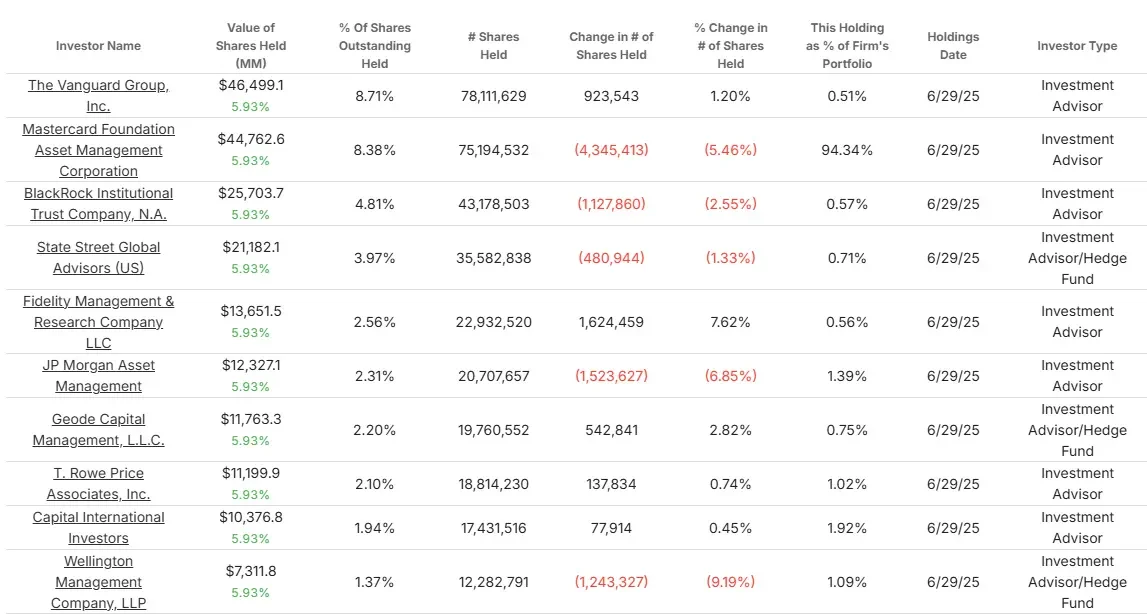Mastercard (NYSE: MA) is a global payments company that connects consumers, businesses, and financial institutions through its vast network, processing trillions of dollars in transactions every year. It has steadily risen into one of the world’s most valuable financial companies, recently trading around $595 per share with a market cap of about $538 billion.
Once a pioneering credit card network, Mastercard has evolved into a payments powerhouse operating in more than 210 countries and territories. Its wide moat comes from massive transaction volumes, operating margins near 59%, and returns on capital above 65%, making it one of the most efficient businesses in the market.
As digital payments expand and cash use declines worldwide, Mastercard has become a core holding for institutional investors. Its dominance in consumer and business spending, along with ongoing innovation in fintech, data services, and cross-border transactions, gives it competitive advantages that are difficult to replicate.
Once tied closely to its banking founders, Mastercard today is widely held by passive giants, asset managers, and hedge funds, reflecting its transition from a traditional card network into a global financial infrastructure leader.
Who Are Mastercard’s Top Shareholders?

See whether Mastercard’s top shareholders are buying or selling today >>>
Mastercard operates one of the largest global payment networks, enabling consumers, businesses, and banks to transact securely across more than 210 countries. Its stock is mainly held by passive index giants, alongside a few active managers shifting exposure.
- The Vanguard Group: 78.1M shares (8.7%), ~$46.5B. Added 923K (+1.2%).
- Mastercard Foundation Asset Mgmt: 75.2M (8.4%), ~$44.8B. Cut 4.35M (-5.5%).
- BlackRock: 43.2M (4.8%), ~$25.7B. Trimmed 1.13M (-2.6%).
- State Street: 35.6M (4.0%), ~$21.2B. Reduced 481K (-1.3%).
- Fidelity: 22.9M (2.6%), ~$13.7B. Boosted 1.62M (+7.6%).
- JP Morgan Asset Mgmt: 20.7M (2.3%), ~$12.3B. Cut 1.52M (-6.9%).
- Geode Capital: 19.8M (2.2%), ~$11.8B. Added 543K (+2.8%).
One highlight from last quarter is Bridger Management, led by Roberto Mignone, which boosted its Mastercard stake by nearly 288%, now holding about 9,300 shares worth $5 million. That kind of sharp increase looks like a strong bet on Mastercard’s long-term growth.
Another notable move came from Jane Street Group, which lifted its position by over 448% to about 348,000 shares valued at $195 million. Such a big jump suggests rising confidence in Mastercard’s stability and cash flow strength.
Passive funds like Vanguard and BlackRock help anchor Mastercard’s ownership, keeping it stable in global indices. Among active managers, Fidelity appears more optimistic, while others like JP Morgan and Mastercard Foundation have been trimming. The hedge fund highlights from Roberto and Jane show that some opportunistic investors are still leaning in.
Track the top shareholders of over 50,000 global stocks (It’s free) >>>
Mastercard’s Recent Insider Trades

Insider transactions can provide a window into how leadership views the company’s prospects, though they often reflect personal financial planning as much as business outlook.
At Mastercard, the latest filings tilt more toward selling, and while the amounts are not large compared to overall ownership, they still show how executives are managing their exposure.
Here are some recent insider sales:
- Sachin J. Mehra (CFO): Received 17K shares as part of compensation at ~$585–590 in August.
- Ling Hai (Officer): Received and sold 4,485 shares at ~$600.
- Timothy Murphy (Officer): Reported a disposition in August.
These moves look like modest sales, possibly tied to diversification or preset plans. The lack of insider buying may suggest leaders are cautious about adding at today’s prices, though selling alone does not always signal a negative outlook.
See recent insider trade data for over 50,000 global stocks (It’s free) >>>
What the Ownership & Insider Trade Data Tell Us
Putting shareholder trends and insider activity together gives a fuller view of how Mastercard is being treated by both institutions and its own leadership. The shareholder base remains dominated by passive giants like Vanguard and BlackRock, providing stability and steady demand.
At the same time, active managers appear more divided, with some adding and others trimming exposure. On the insider side, activity has leaned toward selling, with no major purchases in sight.
The overall picture suggests institutions continue to back Mastercard as a long-term compounder, but insider sentiment looks more cautious. For investors, that combination points to broad external confidence balanced against a more measured stance from those running the company day-to-day.
Wall Street Analysts Are Bullish on These 5 Undervalued Compounders With Market-Beating Potential
TIKR just released a new free report on 5 compounders that appear undervalued, have beaten the market in the past, and could continue to outperform on a 1-5 year timeline based on analysts’ estimates.
Inside, you’ll get a breakdown of 5 high-quality businesses with:
- Strong revenue growth and durable competitive advantages
- Attractive valuations based on forward earnings and expected earnings growth
- Long-term upside potential backed by analyst forecasts and TIKR’s valuation models
These are the kinds of stocks that can deliver massive long-term returns, especially if you catch them while they’re still trading at a discount.
Whether you’re a long-term investor or just looking for great businesses trading below fair value, this report will help you zero in on high-upside opportunities.
Click here to sign up for TIKR and get our full report on 5 undervalued compounders completely free.

